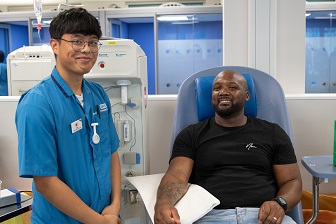How to donate plasma
This page explains what to expect on the day and how to prepare for your donation.
On this page:

How to prepare before your appointment
To help make sure you're able to donate on the day and your appointment runs smoothly, there are some steps you can take to prepare in the hours and days before your appointment.
Check you're eligible to donate
Before travelling to your appointment, make sure you're eligible to donate on the day.
You may need to wait to donate if you're feeling unwell or if you have recently had a tattoo, visited certain countries, visited the dentist or had sexual contact with a new partner.
Check you can donate with our online quiz.
This check will also highlight if anything in your medical history could mean it's not safe for you to ever donate plasma.
If you need to cancel or reschedule your appointment for any reason, please log in to your account or phone us on 0300 123 23 23 as soon as possible, so that we can make your appointment available to another donor.
Get ready for your appointment
If you are eligible to donate on the day:
- Stay hydrated in the days leading up to your donation by drinking plenty of water and avoiding caffeine or alcohol. The more hydrated you are, the quicker your donation will be.
- Eat regular, nutritious meals in the days before your appointment. Avoid fatty or greasy food, such as takeaways or anything deep fried, because this can affect the quality of your plasma
- Wear loose, comfortable clothes, with sleeves that can be rolled up easily. We also recommend clothing that allows you to easily get in and out of the donation chair and sit comfortably for the duration of your donation
- Plan your journey to your donation centre in Birmingham, Reading or Twickenham
What to expect during your appointment
Your first appointment takes up to 90 minutes because we need to complete extra checks before your first donation. After this, regular appointments take around 60 minutes.
From the moment you arrive at your donation session, we will guide you through the process, explain what we are doing and answer any questions you may have about plasma donation.
If you want to bring a child with you to your appointment, please read the rules about children at our donation venues. This is to make sure everyone at our donation centres is safe and comfortable.

Step 1 - your vein check
If you're donating plasma for the first time, we will assess your veins. This is to make sure you have a vein that's suitable for plasma donation.
Veins that are suitable for blood donation may not be suitable for plasma donation, because the donation process is different.

Step 2 - your safety check
To check it's safe for you to donate, we'll ask you to complete a questionnaire about your medical history, lifestyle and recent travel.
We'll then check your pulse, talk through your questionnaire and take a drop of blood from your finger to check your haemoglobin (iron). This is to make sure it won't be too low after donating. We'll also ask for your consent to donate.

Step 3 - your plasma donation
During your donation, a small amount of blood is collected from a vein in your arm and passed through a machine, which separates the plasma. The rest of your blood is returned to your vein via the same needle. This happens in a few continuous cycles throughout your donation.
This part of the process takes around 35-45 minutes. Health care assistants and nurses will be nearby throughout, in case you need anything.

Step 4 - your donation is complete
After your donation is complete, we'll make sure the bleeding has stopped before applying a dressing to your arm. We'll give you some advice on how to take care of yourself after you leave the donor centre.
Our staff will care for you until it's safe for you to leave. If you feel unwell or have any questions after your donation, we will be on hand to help you.
How to take care of yourself after your appointment
After your donation, your body will replenish your plasma within 24 to 48 hours.
Once you leave the donation centre, you can return to your normal daily activities, but avoid any strenuous exercise for the rest of the day. Remember to drink plenty of fluids and eat well, to help you to recover.
If you feel unwell in the days after your donation or if you have any concerns, please call 0300 123 23 23. The team will put you in contact with one of our clinical experts, who can provide you with support and advice.

How often can you donate plasma?
You can donate plasma more often than you can donate blood, because the recovery time is shorter. Many of our plasma donors donate up to 6 times per year, although you can donate plasma as often as every 2 weeks, if you wish.
There is a growing need for the unique medicines made from plasma. It takes about 21 plasma donations to help save the life of a baby with Kawasaki disease, by protecting their heart from complications. It takes about 124 donations to help save the life of someone with a bacterial infection called toxic shock syndrome. (These figures are based on the average annual plasma requirement for each condition.)

